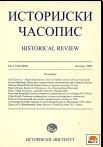Образовање у време владавине краља Милана
Education during the Rule of King Milan
Author(s): Arsen ĐurovićSubject(s): History
Published by: Istorijski institut, Beograd
Keywords: Kingdom; Serbia; king; Milan; modernization; society; education; school; teacher; law; studen;; textbook; reader
Summary/Abstract: The reign of King Milan was perhaps the most important one for the future of the Serbian people. There was neither choice nor time. Finding himself on the throne of the state that had several centuries of tradition, at the age characterized by impulsiveness and instability, King Milan did not always find the right way nor the right solutions for the numerous problems that needed to be solved immediately, without hesitation. At the same time, this deprived him of the time for corrections, so the consequences for him and for the state were, naturally, more severe. Seen as a whole, his reign (1868- 1889) was successful in some areas of economic and social life. It was also successful in the area of education. A thorough analysis shows that Serbia, when speaking of this highly sensitive and definitively important area of social life, had a serious state policy, based on the idea of the modernization of education. Its chief ideologist was Stojan Novaković, a well-known scientist and politician, who was completely dedicated to the main aim placed before himself and his collaborators — the creation of a modern education system. That complex and demanding task, started during the 1880s, at the very moment when modernization was taking place in many European countries (France, Great Britain, Germany, etc.). It was a timely and brave move, the decision that opened for the Serbian people a perspective of life in the coming century. Its realization was not possible without the support of King Milan. Of course, this does not mean that he was chiefly responsible for the realization of this project. The most important for it were representatives of the education elite at the time, many of whom directly participated in the government, and were close to the Court. The results of their involvement were visible at all levels of education, from elementary, through middle, and all the way to higher. Opening of new schools, education of state stipendists, but also training of teachers and professors at the most well known European universities, the reformed Higher School, were all the results of this modernization. When we add to this modern textbooks and handbooks similar to the ones used in European school, we reach the conclusion that this was actually the best support to the state which modernized it self, even with great resistance. All of this should be considered when the final verdict about the personality and the reign of King Milan is being pronounced. From the perspective of education, the King's personality shows “the other side,” characterized by humanity and political vision.
Journal: Историјски часопис
- Issue Year: 2008
- Issue No: 57
- Page Range: 299-326
- Page Count: 28
- Language: Serbian

